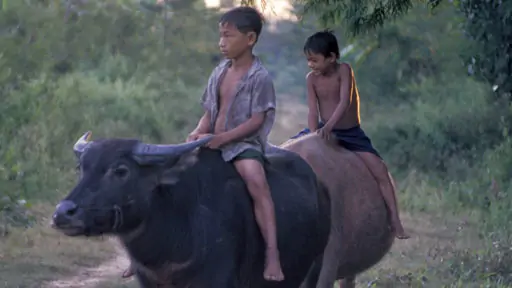Indigenous Calendar April, 2011: Kavet Boys and a Lesson in Education

One of the most universal, stereotypical views of indigenous people is that they are uneducated. To understand what belies such a widely-held opinion we must first understand that it comes from those who view education to be the same as formal, academic schooling. Next we must understand the difference between education and formal, academic schooling.
I was approaching a remote Kavet village in northeastern Cambodia. My guide and I had been traveling since very early in the morning. I can't remember how many streams we'd forded, how many hills we'd climbed or how many insects had bitten us during the twelve hours we'd been traveling but I can remember how relieved I felt that there would at least be basic accommodation available to us that night.
And basic it was. I slept outside under a full moon in my sleeping bag on my hammock which I'd tied between two trees at the edge of our hosts' rice field. If I could have scripted this much detail in advance I would have certainly added the full moon but I would have probably removed it later because, real as it was that night, it would have seemed like too much dramatic license. Exhausted as I was from the day's long travel, I was too mentally stimulated to sleep much.
I was awoken in the early hours of the morning with the full moon still shining. Three adult, wild pigs had found their way to the edge of the rice field and were eating the rice. They hadn't expected to find me there — nor I them. My first thought was to run for my camera. Fortunately my instinct immediately kicked in and I realized that I'd then be the first chicken in the chicken game the pigs and I were now playing. They stopped eating and we stared each other down for the next twenty minutes. I then lay motionless for the ten minutes it took before I was confident they had retreated.
With my life now safe, I could again act on instinct. I woke up my hosts and, through vocal tone and sign language, I communicated what had happened. Almost naked, they went running into their rice field and returned about twenty minutes later satisfied that the pigs had gone. My guide was still asleep and, through vocal tone and sign language, my hosts communicated their thanks to me.
At breakfast later that morning I was left wondering where my instincts had come from the previous night: anything remotely close to this experience was entirely alien to me. As I pondered my question I remembered the first photo I'd taken when I entered the village. When I took the photo it didn't occur to me that boys this young in my own culture would be scared of even domesticated animals as large as the ones they were riding. Then it occurred to me that my own lack of education had made an adult man scared of animals so small that these same boys would have probably laughed at me — having never seen anyone react the way I had.
The Kavet are featured in our documentary, Indigenous Peoples of Southeast Asia.
If you enjoyed reading this article, please consider supporting independent, advertising-free journalism by buying us a coffee to help us cover the cost of hosting our web site. Please click on the link or scan the QR code. Thanks!


